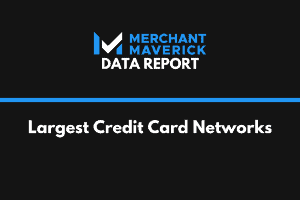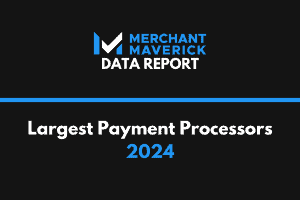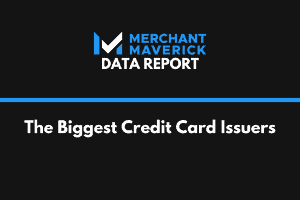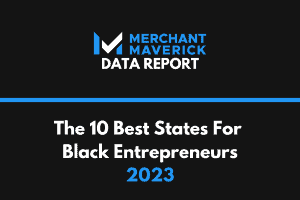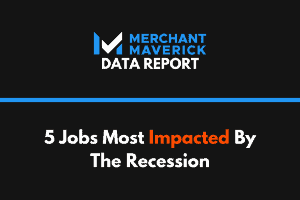Our content reflects the editorial opinions of our experts. While our site makes money through
referral partnerships, we only partner with companies that meet our standards for quality, as outlined in our independent
rating and scoring system.
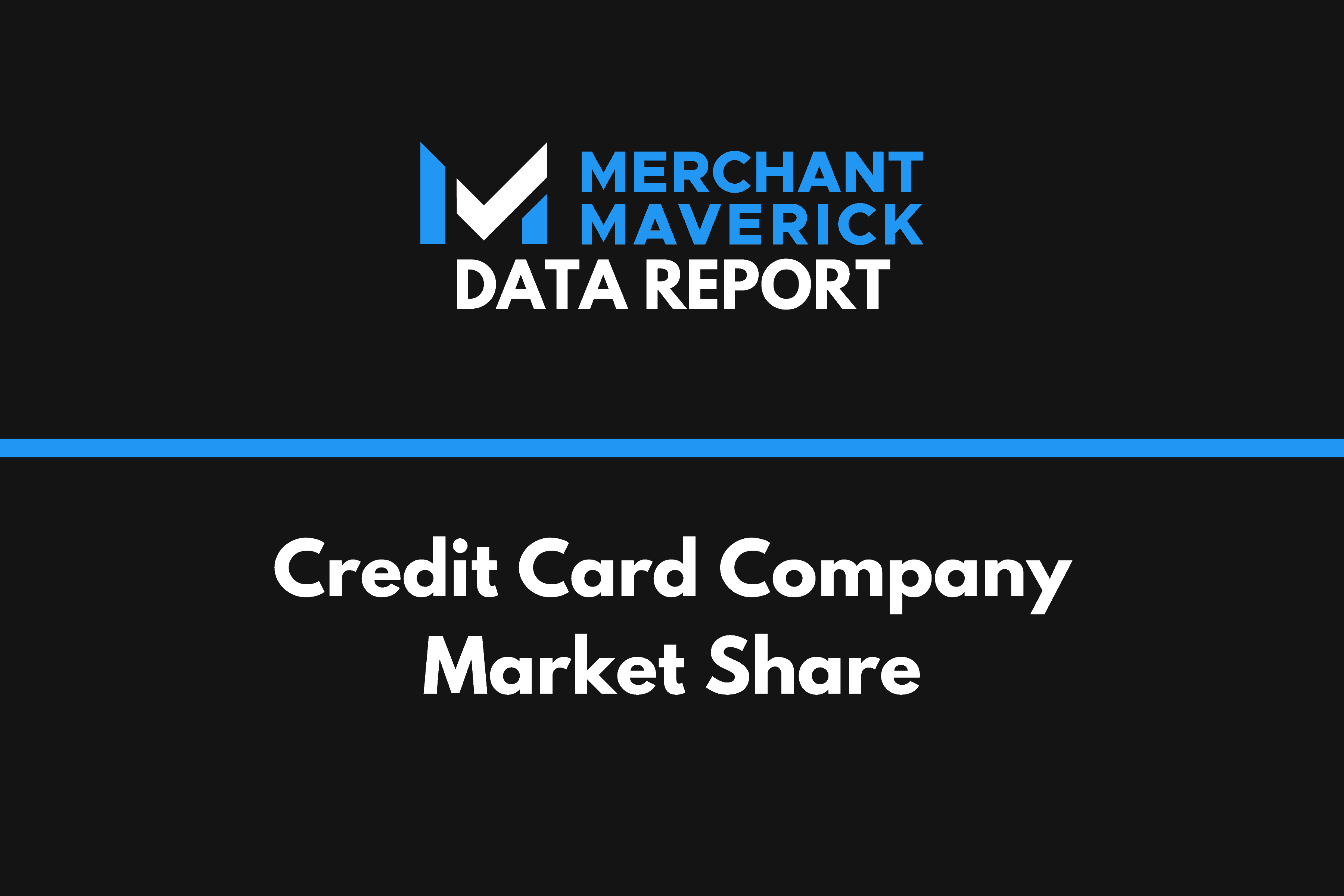
The credit card industry has many players, from credit card issuers, to credit card networks, to merchant acquirers. Each handles a different part of a credit card transaction, allowing customers to draw on a revolving line of credit at checkout.
This report presents an overview of the biggest credit card companies in each of these roles.
How Does Credit Card Company Market Share Affect Merchants?
Competition in any market means more alternatives, which generally means more competitive pricing. Case in point, businesses that want to accept credit cards are largely at the mercy of interchange fees, which are set by four credit card networks.
On the other hand, it’s also worth knowing who the big players are as they can sometimes provide better economy of scale to merchants, or offer advantages to companies that fall into their area of specialization.
Credit Card Transaction Lifecycle
When your customer swipes, dips, or taps their credit card at your terminal or enters their information on your website, they initiate a credit card card transaction.
Here’s where each credit card company comes in:
1. Merchant Acquirer
The merchant acquirer is the company that provides your merchant account or provides merchant services to your third-party payment processor. The merchant acquirer settles card transactions and collects all the fees associated with your credit card transaction. If your merchant acquirer is also your payment processor, it will be responsible for markup fees and the pricing model you are offered; for example tiered, flat-rate, or interchange-plus pricing. Some merchant acquirers also issue credit cards.
When your customer initiates a transaction, their credit card information is sent to your merchant acquirer for processing.
2. Credit Card Network
Credit card networks provide the infrastructure for your credit card payments, essentially allowing all of the component parts of the transaction to talk to each other. Credit card networks set the base fees for transactions, called interchange fees. They also provide some secondary benefits to cardholders like warranty extensions and rental car insurance. Some credit card networks also issue credit cards.
Your merchant acquirer will send your customer’s transaction data through the card’s credit card network to the customer’s card issuer.
3. Card Issuer
The customer’s card issuer is the company that provided the credit card in the first place. Card issuers provide a revolving line of credit that cardholders draw upon, as well as reward programs for using the card. The card issuer will generally be the cardholder’s point of contact for disputing transactions and other issues involving their card.
Credit Card Company Market Share Terminology
Two of the most common ways to measure a credit card company’s market share are by purchase volume and number of transactions.
Purchase volume is the combined dollar value of all purchases handled by the company for a given year.
Transactions are, simply, the number of transactions handled by the company regardless of the amounts transacted.
Merchant Acquirer Market Share
Merchant acquirers process and settle credit card and signature debit transactions. For a deeper look at the merchant acquirers featured here, check out our report on the largest payment processors.
Merchant Acquirer Market Share By Purchase Volume
When it comes to purchase volume, three merchant acquirers each processed over $1 trillion in 2021: Chase, Fiserv, and Worldpay from FIS. Chase led the market with $1.74 trillion in purchase volume, followed by Fiserv with $1.58 trillion.
| Acquirer |
Purchase Volume (billions) |
Est. % of market |
| J.P. Morgan Chase |
$1,740.51 |
18.5 |
| Fiserv |
$1,589.85 |
16.9 |
| Worldpay from FIS |
$1,563.59 |
16.6 |
| Wells Fargo |
$734.61 |
7.8 |
| Global Payments |
$673.79 |
7.2 |
| Bank of America |
$456.48 |
4.9 |
| Elavon |
$351.64 |
3.7 |
| PNC Merchant Serv. |
$86.82 |
0.9 |
| Paysafe Group |
$70.19 |
0.7 |
| Priority Tech. |
$62.27 |
0.7 |
Merchant Acquirer Market Share By Number Of Transactions
On the other hand, measured by raw number of transactions, Fiserv--which supports the popular Clover line of hardware--led the pack with over 34 billion transactions in 2021, followed by Chase with 31.8 billion, and Worldpay from FIS with 31.02 billion.
| Acquirer |
Transactions (billions) |
Est. % of market |
| Fiserv |
34.05 |
25.4 |
| J.P. Morgan Chase |
31.81 |
23.7 |
| Worldpay from FIS |
31.02 |
23.1 |
| Global Payments |
10.73 |
8.0 |
| Wells Fargo |
9.28 |
6.9 |
| Bank of America |
8.49 |
6.3 |
| Elavon |
3.07 |
2.3 |
| Paysafe Group |
1.01 |
0.8 |
| Merrick Bank |
0.75 |
0.6 |
| No. American Bancard |
0.73 |
0.5 |
Credit Card Network Market Share
While there are many credit card issuers and merchant acquirers, there are only four major credit card networks operating within the US: Visa, Mastercard, American Express, and Discover. For a deeper look at the networks, check out our report on the largest credit card networks.
Credit Card Network Market Share By Purchase Volume
Visa is, by most measures, the largest credit card network, having handled $6.65 trillion in purchase volume in 2023, up 2% from 2022. Mastercard comes in a distant second with $2.83 trillion in purchase volume, up almost 6% from 2022.
| Network |
Purchase Volume, US (Billions) |
Est % of purchase volume |
| Visa |
$6,653 |
56.6 |
| Mastercard |
2837 |
24.1 |
| American Express |
1680.1 |
14.3 |
| Discover |
589.158 |
5.0 |
Credit Card Network Market Share By Number Of Transactions
Visa also takes first place when it comes to the number of transactions, although its lead over Mastercard isn't quite as pronounced. Visa handled 212.5 billion transactions in 2023 to Mastercards's 183.6 billion. Discover, notably, handled over 2 billion more transactions in 2023 than American Express, but these transactions were, on average, considerably smaller.
| Network |
Network Transactions (Millions) |
Est % of transactions |
| Visa |
212,579 |
51.0 |
| Mastercard |
183,636 |
44.1 |
| American Express* |
9,000 |
2.2 |
| Discover |
11433 |
2.7 |
Credit Card Issuer Market Share
Credit card issuers represent a variety of financial institutions that offer lines of credit to consumers, businesses, and corporations by way of a credit card. For a closer look at credit--and debit--card issuers, check out our report on the largest credit card issuers.
Credit Card Issuer Market Share By Purchase Volume
Big national and regional banks make up most of the 10 largest credit card issuers by purchase volume, with Chase taking a comfortable lead in 2021 with $950.47 billion, followed by Bank of America in third place with $413.97. Credit card network and issuer American Express took second place with $834 billion in purchase volume, with rival Discover coming in sixth with $182.12 billion.
| Issuer |
Purchase Volume (billions) |
Est % of market |
| JPMorgan Chase |
$950.47 |
20.8 |
| American Express |
$834.00 |
18.3 |
| Citi |
$482.60 |
10.6 |
| Capital One |
$454.96 |
10.0 |
| Bank of America |
$413.97 |
9.1 |
| Discover |
$182.13 |
4.0 |
| U.S. Bank |
$165.71 |
3.6 |
| Wells Fargo |
$140.64 |
3.1 |
| USAA |
$52.83 |
1.2 |
| PNC Bank |
$45.46 |
1.0 |
Credit Card Issuer Market Share By Number Of Transactions
When measured by number of transactions, Chase and American Express maintain their positions with 11.26 billion and 5.79 billion transactions in 2021, respectively. Capital One, notably, jumps up to third place thanks to the sheer number of cards it issues (106.9 million in force for 2021).
| Issuer |
Transactions (billions) |
Est. % of market |
| J.P. Morgan Chase |
11.26 |
23.0 |
| American Express |
5.79 |
11.8 |
| Capital One |
5.19 |
10.6 |
| Citi |
4.73 |
9.7 |
| Bank of America |
4.55 |
9.3 |
| Discover |
3.26 |
6.7 |
| U.S. Bank |
1.5 |
3.1 |
| Wells Fargo |
1.47 |
3.0 |
| Synchrony |
0.87 |
1.8 |
| Barclays |
0.84 |
1.7 |
Notes
Credit card issuer and merchant acquirer data is drawn from the 2023 Nilson Report. Credit card network data is drawn from company SEC disclosures.







